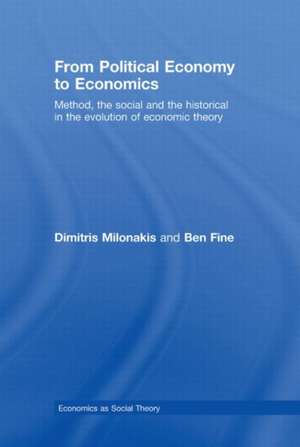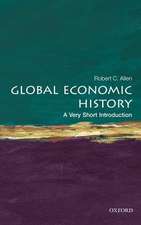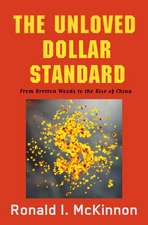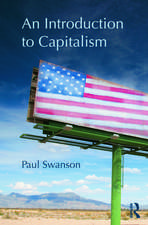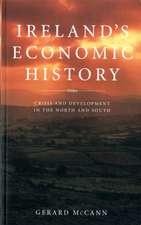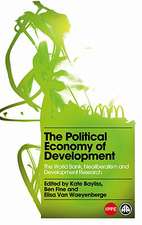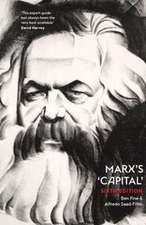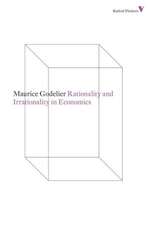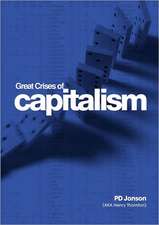From Political Economy to Economics: Method, the social and the historical in the evolution of economic theory: Economics as Social Theory
Autor Dimitris Milonakis, Ben Fineen Limba Engleză Hardback – 28 oct 2008
The book ranges over the shifting role of the historical and the social in economic theory, the shifting boundaries between the economic and the non-economic, all within a methodological context. Schools of thought and individuals, that have been neglected or marginalised, are treated in full, including classical political economy and Marx, the German and British historical schools, American institutionalism, Weber and Schumpeter and their programme of Socialökonomik, and the Austrian school. At the same time, developments within the mainstream tradition from marginalism through Marshall and Keynes to general equilibrium theory are also scrutinised, and the clashes between the various camps from the famous Methodenstreit to the fierce debates of the 1930s and beyond brought to the fore.
The prime rationale underpinning this account drawn from the past is to put the case for political economy back on the agenda. This is done by treating economics as a social science once again, rather than as a positive science, as has been the inclination since the time of Jevons and Walras. It involves transcending the boundaries of the social sciences, but in a particular way that is in exactly the opposite direction now being taken by "economics imperialism". Drawing on the rich traditions of the past, the reintroduction and full incorporation of the social and the historical into the main corpus of political economy will be possible in the future.
| Toate formatele și edițiile | Preț | Express |
|---|---|---|
| Paperback (1) | 469.23 lei 43-57 zile | |
| Taylor & Francis – 28 oct 2008 | 469.23 lei 43-57 zile | |
| Hardback (1) | 1217.42 lei 43-57 zile | |
| Taylor & Francis – 28 oct 2008 | 1217.42 lei 43-57 zile |
Din seria Economics as Social Theory
-
 Preț: 279.86 lei
Preț: 279.86 lei - 15%
 Preț: 543.23 lei
Preț: 543.23 lei - 8%
 Preț: 441.24 lei
Preț: 441.24 lei -
 Preț: 356.10 lei
Preț: 356.10 lei -
 Preț: 295.82 lei
Preț: 295.82 lei -
 Preț: 428.09 lei
Preț: 428.09 lei - 18%
 Preț: 1436.89 lei
Preț: 1436.89 lei - 15%
 Preț: 419.81 lei
Preț: 419.81 lei - 26%
 Preț: 354.65 lei
Preț: 354.65 lei - 15%
 Preț: 426.70 lei
Preț: 426.70 lei - 15%
 Preț: 470.87 lei
Preț: 470.87 lei -
 Preț: 377.66 lei
Preț: 377.66 lei -
 Preț: 478.03 lei
Preț: 478.03 lei -
 Preț: 417.20 lei
Preț: 417.20 lei - 15%
 Preț: 576.47 lei
Preț: 576.47 lei - 43%
 Preț: 207.05 lei
Preț: 207.05 lei - 26%
 Preț: 766.31 lei
Preț: 766.31 lei -
 Preț: 532.58 lei
Preț: 532.58 lei - 15%
 Preț: 430.45 lei
Preț: 430.45 lei - 30%
 Preț: 850.99 lei
Preț: 850.99 lei - 15%
 Preț: 456.21 lei
Preț: 456.21 lei - 15%
 Preț: 422.26 lei
Preț: 422.26 lei - 15%
 Preț: 458.59 lei
Preț: 458.59 lei - 15%
 Preț: 470.85 lei
Preț: 470.85 lei - 18%
 Preț: 1672.42 lei
Preț: 1672.42 lei - 30%
 Preț: 1017.37 lei
Preț: 1017.37 lei - 15%
 Preț: 515.60 lei
Preț: 515.60 lei - 27%
 Preț: 251.80 lei
Preț: 251.80 lei - 18%
 Preț: 1000.27 lei
Preț: 1000.27 lei - 18%
 Preț: 1282.67 lei
Preț: 1282.67 lei - 15%
 Preț: 463.49 lei
Preț: 463.49 lei - 15%
 Preț: 478.96 lei
Preț: 478.96 lei - 18%
 Preț: 1273.35 lei
Preț: 1273.35 lei
Preț: 1217.42 lei
Preț vechi: 1634.94 lei
-26% Nou
Puncte Express: 1826
Preț estimativ în valută:
233.03€ • 253.20$ • 195.87£
233.03€ • 253.20$ • 195.87£
Carte tipărită la comandă
Livrare economică 21 aprilie-05 mai
Preluare comenzi: 021 569.72.76
Specificații
ISBN-13: 9780415423229
ISBN-10: 0415423228
Pagini: 392
Dimensiuni: 156 x 234 x 25 mm
Greutate: 0.89 kg
Ediția:1
Editura: Taylor & Francis
Colecția Routledge
Seria Economics as Social Theory
Locul publicării:Oxford, United Kingdom
ISBN-10: 0415423228
Pagini: 392
Dimensiuni: 156 x 234 x 25 mm
Greutate: 0.89 kg
Ediția:1
Editura: Taylor & Francis
Colecția Routledge
Seria Economics as Social Theory
Locul publicării:Oxford, United Kingdom
Public țintă
Postgraduate and UndergraduateCuprins
1 Introduction, 2 Smith, Ricardo and the First Rupture in Economic Thought, 3 Mill’s Conciliation, Marx’s Transgression, 4 Political Economy as History: Smith, Ricardo, Marx, 5 Not by Theory Alone: German Historismus, 6 Marginalism and the Methodenstreit, 7 The Marshallian Heritage, 8 British Historical Economics and the Birth of Economic History, 9 Thorstein Veblen: Economics as a Broad Science, 10 Commons, Mitchell, Ayres and the Fin de Siècle of American Institutionalism, 11 In the Slipstream of Marginalism: Weber, Schumpeter and Sozialökonomik, 12 Positivism and the Separation of Economics from Sociology, 13 From Menger to Hayek: The (Re)Making of the Austrian School, 14 From Keynes to General Equilibrium: Short and Long Run Revolutions in Economic Theory, 15. Beyond the Formalist Revolution
Notă biografică
Dimitris Milonakis is Associate Professor and Head of the Department of Economics at the University of Crete.
Ben Fine is Professor of Economics at the School of Oriental and African Studies, University of London.
Ben Fine is Professor of Economics at the School of Oriental and African Studies, University of London.
Recenzii
Winner of the Gunnar Myrdal Prize for 2009
Descriere
Winner of the Gunnar Myrdal Prize of the European Association for Evolutionary Political Economy for 2009.
Developments within economics of incorporating the historical (and the social, institutional, etc more generally) have been welcomed as progress over excessive formalism and lack of realism. But, by situating these developments in terms of the shifting relationship between economics, the historical and an evolving economics imperialism, a fuller understanding of the role of economic theory and the historical is presented as a prerequisite for analysis that aspires fully to address economic and historical change.
Developments within economics of incorporating the historical (and the social, institutional, etc more generally) have been welcomed as progress over excessive formalism and lack of realism. But, by situating these developments in terms of the shifting relationship between economics, the historical and an evolving economics imperialism, a fuller understanding of the role of economic theory and the historical is presented as a prerequisite for analysis that aspires fully to address economic and historical change.
